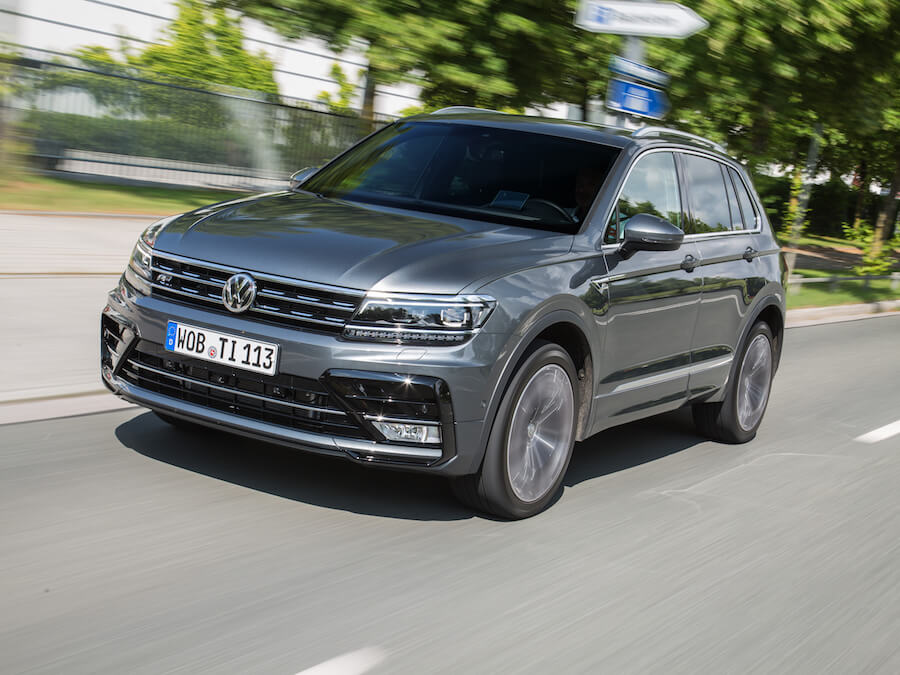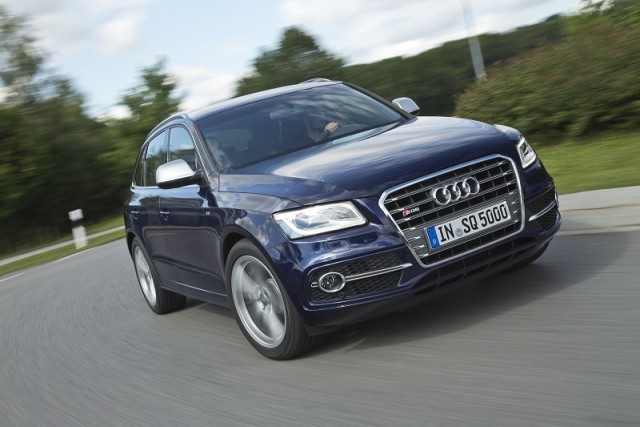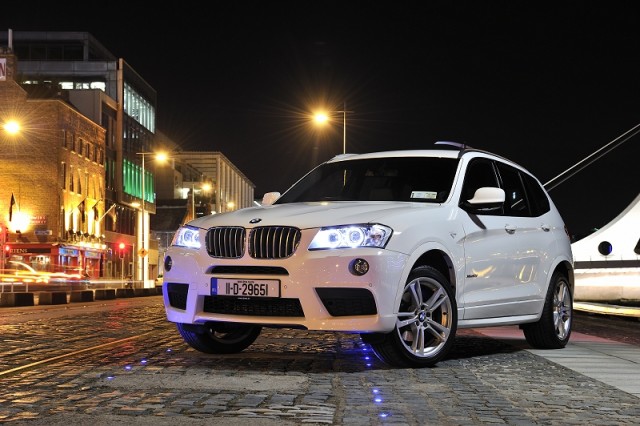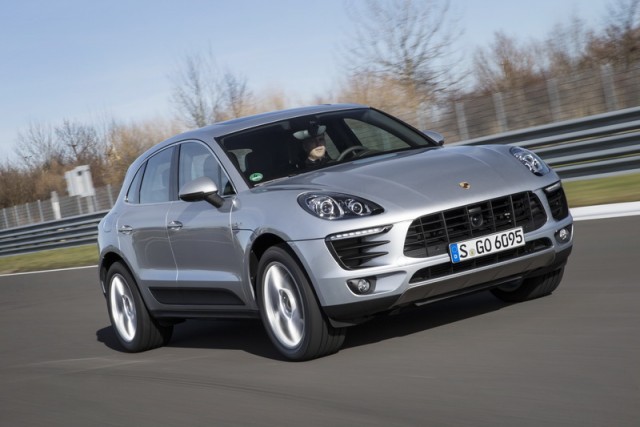A 240hp bi-turbocharged TDI diesel engine and a muscular body kit turn the Volkswagen Tiguan into a junior Porsche Macan (sort of), but it would to be pretty hard to justify the price tag, which is why Volkswagen Ireland won't be offering it for sale.
In the metal
We've always though that the new Tiguan, especially with the extra bulk and visual heft of the R-Line body kit, is an uncommonly good-looking SUV and that's a visual impact that's increased here as our test car was rolling on big, black 20-inch alloy wheels and watch-strap Continental tyres. If you can find us a meaner-looking mass-market crossover, we'll eat our BiTurbo baseball caps.
BiTurbo? Oh yes, this Tiguan is packing the latest generation of Volkswagen's hard-hitting 2.0-litre twin-blower engine, which in this form produces a very healthy 240hp and 500Nm of torque. That's more grunt than a mid-nineties 911 in your family-friendly SUV, sir or madam. The engine is actually physically the same as the standard 2.0-litre TDI, but it has more complex plumbing for the two turbos (one small, one big for quicker response across the rev range) and a bigger intercooler. Oh, and the timing belt replacement interval drops from 210,000km to 120,000km because it has more to do.
Controlling that excess of velocity is a seven-speed DSG automatic gearbox and 4Motion four-wheel drive, not to mention wheelarch extensions and a skeletal sports three-spoke steering wheel.
Inside, the cabin is bursting with technology, and you might grant us a few minutes to dwell on that, because for Volkswagen the bits with electrons are at least, if not more, important than the bits with turbos. The Tiguan is debuting a new interconnected service and infotainment system that can either be fitted with its own built-in SIM-card communicator or piggyback off your mobile phone signal. Once it's up and running (and you really will need an expert on hand to walk you, slowly, through it for the first time) you can do all sorts of things, from calling up five-day forecasts on the central infotainment display to browsing maps and destinations on your tablet, smartphone or laptop at home and sending, with a single click, the same information to the car's navigation system.
There's a new Service & Security system too that does a few interesting things. It has its own dedicated SIM card that means it can make emergency calls (either by pushing a button yourself if you've had a minor knock and need assistance, or need breakdown recovery, or - in a real emergency - automatically if it detects that the airbags and seatbelt pre-tensioners have fired). The system can also keep an eye on the car's on-board diagnostic system and when it needs a service it will either send you an alert or, if you prefer, get your dealer to make an automatic service booking and ring you back. For nervy parents there are also alerts to your mobile if it detects that a speed limit has been exceeded or a pre-set area has been left, and you can do more expected things like check how much fuel is in the tank or make sure the doors are locked from half a world away. There is even more connectivity (such as for media playing from a tablet in the back seat, or reminders of where you parked the car last), but it all starts to get a bit bewildering, not to mention the concerns over security from malicious attacks now that there are so many ways of communicating with the car (you can even connect the car to an external Wi-Fi network for downloading chunky files such as map updates). There's cost to consider too, and Volkswagen was unable to tell us quite how much it expects all of this to cost on an ongoing basis.
Mind you, you do start to wonder quite how much of this anyone's going to use in day-to-day life. It's certainly clever and potentially useful, but it's really going to depend on how tech-savvy you are, how much you view your car as an extension of your digital lifestyle and, probably, how well your local dealership is going to be equipped to explain it all to you.
The rest of the Tiguan is just as we left it - beautifully made cabin, gorgeous (optional) all-digital instruments, roomy boot and spacious back seat (broad enough, just, for three child car seats we'd reckon).
Driving it
With 240hp and as much torque as a Focus RS, you'd expect the 2.0-litre BiTurbo TDI engine to dominate proceedings. But it doesn't. Oddly, it seems rather muted (both in terms of noise and in terms of any potential bombast in its character) and after a while, you do start to wonder if it's really worth the extra you'll need to upgrade from the 190hp 2.0-litre mono-turbo TDI. That's a car that costs €44k in Ireland, where as we expect the BiTurbo to come in at closer to €47,000 (not helped by a chunky 167g/km CO2 figure). In the UK, generally a more power-hungry nation than us, Volkswagen expects the BiTurbo to make up a relatively small ten per cent of overall sales. I'd suggest it would be more like 1 per cent here...
But there is some enjoyment to be found. In spite of the small, light-pressure turbo that is intended to kick off proceedings at low rpm, there's still half a beat of lag as the turbos, the engine management system and the seven-speed DSG gearbox work out how to provide maximum thrust. After that, the Tiguan picks up and flies, with low-speed oomph rapidly translating into a really juicy mid-range that feels as if you're just chucking fuel into a vast jet afterburner. It does tail off once you pass 3,500rpm so the power band is classically diesel-narrow, but by the time you've reached the top end you're already well into illegal figures. Unless, like us, you were driving it on a German autobahn and could crank the Tiguan all the way up to its maximum speed, at which it sits happily, albeit with quite a lot of wind noise.
Slow back down and it's an impressively refined car, with wind and tyre noise kept well in check. The engine is a little noisier than the standard single-turbo TDI it must be said (hardly surprising given the extra pipework, the bigger cooling system and the higher pressure for the fuel injection), but it's a minor, distant, occasional clatter somewhere off in the distance.
The Tiguan's Achilles' heel is that it's just not much fun to drive. The steering is light, easy on the wrists and quick, but there's little sensation of feedback. The body control is supreme - the damn thing hardly rolls a single degree in corners - but the ride, on stiffer springs and those big, optional, 20-inch wheels, is just too stiff, too jittery, especially at urban speeds. It's fine, and it never puts a foot (wheel) wrong, but there's just nothing about it that stays with you once you park it up.
Mind you, it's operating in a class in which that could equally be said of pretty much all its major rivals, so there's little or no shame in the Tiguan not being much of a sports car. Still, we'd have liked to see a little more brio for this range-topping version (you can even call up a Nissan GTR-style G-Meter on the dash, for heaven's sake) so it's a little disappointing to find it feels so predictable.
What you get for your money
While our test cars were loaded with every option imaginable (the full connected infotainment suite, the digital instruments, drive mode selector, an off-road mode, leather everything, Dynaudio stereo and so much more) the simple fact is that the circa €55k (the likely price tag were you to import one) is a lot of money for a Tiguan. On the other hand, the cabin layout and quality is good enough to put Audi's Q5 to shame, so there's that.
Summary
You would think that strapping a second turbo to any engine and turning it up to 240hp would be right up our street, but the Volkswagen Tiguan BiTurbo is oddly unsatisfying. It's not sharp enough to drive for a high-performance version and its performance, while impressive, is a little too clinical. It's still a desirable car, but the best bits of it are equally true of the more basic models in the range.














